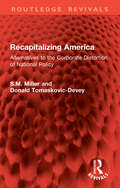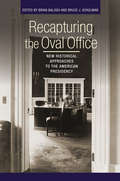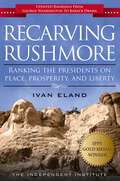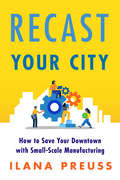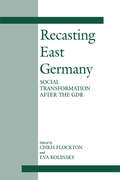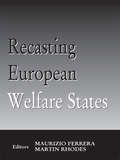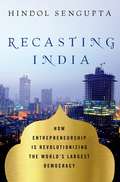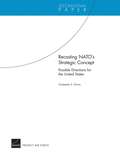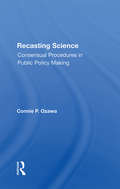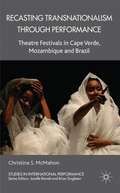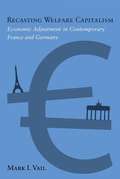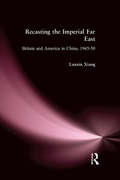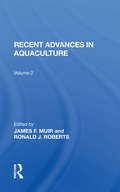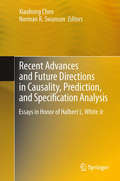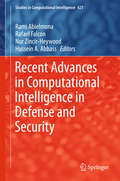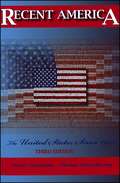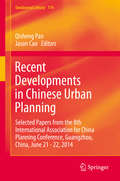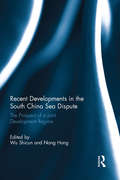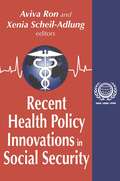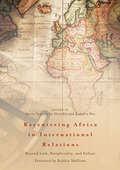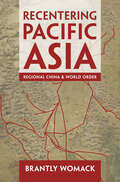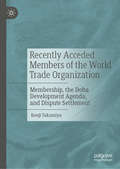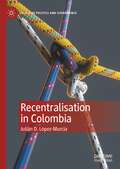- Table View
- List View
Recapitalizing America: Alternatives to the Corporate Distortion of National Policy (Routledge Revivals)
by S.M. Miller Donald Tomaskovic-DeveyFirst published in 1983, Recapitalizing America (now with a new preface by Donald Tomaskovic-Devey) identifies, criticizes, and offers alternatives to the accepted wisdoms of recapitalization, whose variants include not only Reaganomics and Thatcherism but also the less rigid neo-liberal and even liberal policy proposals likely to supplant them. The authors do not want simply to restore the Keynesian welfare state liberalism of the past, but to change and build beyond it.If the economic ideology of pro-business recapitalization is productivity, the social ideology is the deliberate widening of inequalities and the legitimation of the inegalitarian trends. In opposition to this erosion of support for greater equality, Miller and Tomaskovic-Devey first expose the faulty economic analysis of recapitalization and then propose an alternative economics and politics which are grounded in a commitment to social justice. More specifically, they argue that high-technology jobs cannot solve the problem of unemployment, that the U.S. does not suffer from low investment but from the inappropriate use of capital funds, and that higher productivity is no panacea for the complex problems of the American economy. Their prescriptions include a more effective allocation of capital coupled with a realistic assessment of the difficulties faced by democratic planning, advocacy of employment as the social policy, and the recognition that a more caring society depends not only on legislation and administration but more fundamentally on the concern of one citizen for another.
Recapturing the Oval Office: New Historical Approaches to the American Presidency
by Bruce J. Schulman Brian BaloghSeveral generations of historians figuratively abandoned the Oval Office as the bastion of out-of-fashion stories of great men. And now, decades later, the historical analysis of the American presidency remains on the outskirts of historical scholarship, even as policy and political history have rebounded within the academy. In Recapturing the Oval Office, leading historians and social scientists forge an agenda for returning the study of the presidency to the mainstream practice of history and they chart how the study of the presidency can be integrated into historical narratives that combine rich analyses of political, social, and cultural history. The authors demonstrate how "bringing the presidency back in" can deepen understanding of crucial questions regarding race relations, religion, and political economy. The contributors illuminate the conditions that have both empowered and limited past presidents, and thus show how social, cultural, and political contexts matter. By making the history of the presidency a serious part of the scholarly agenda in the future, historians have the opportunity to influence debates about the proper role of the president today. Contributors: Brian Balogh, University of Virginia; Michael A. Bernstein, Tulane University; Kathryn Cramer Brownell, Purdue University; N. D. B. Connolly, The Johns Hopkins University; Frank Costigliola, University of Connecticut; Gareth Davies, University of Oxford; Darren Dochuk, Washington University; Susan J. Douglas, University of Michigan; Daniel J. Galvin, Northwestern University; William I. Hitchcock, University of Virginia; Cathie Jo Martin, Boston University; Alice O'Connor, University of California, Santa Barbara; Bruce J. Schulman, Boston University; Robert O. Self, Brown University; Stephen Skowronek, Yale University
Recarving Rushmore: Ranking the Presidents on Peace, Prosperity, and Liberty
by Ivan ElandWho were the best and worst U.S. presidents? In the past when historians and scholars have rated the presidents, their evaluations often have been based on individual charisma, activism, and service during periods of crisis.Taking a distinctly new approach in Recarving Rushmore, Ivan Eland profiles each U.S. president from Washington to Obama on the merits of his policies and whether those strategies contributed to peace, prosperity, and liberty. This ranking system is based on how effective each president was in fulfilling his oath to uphold the Constitution. Contrary to the preferences of modern conservatives and liberals, this oath was intended to limit the role of the federal government. Readers will be intrigued to discover why, of the four men given exalted representations on Mount Rushmore, only Washington deserves the honor. They will learn why Teddy Roosevelt has been overrated; why Jefferson hypocritically violated his lofty rhetoric of liberty; and why Lincoln provoked a civil war that achieved far less than believed. Readers will uncover why some presidents are rated much higher than the conventional wisdom—for example, Warren Harding—and some rank much lower—for example, Harry Truman. As for more modern U.S. chief executives, Republicans will be astounded to learn that Nixon was the last liberal president and that Reagan wasn&’t all that conservative. Democrats will be amazed to learn that Clinton was in some respects more conservative than George W. Bush and why both Obama and Bush are ranked as bad. Readers will learn why the author goes against the grain and anoints Eisenhower and Carter as the two best modern presidents.
Recast Your City: How to Save Your Downtown with Small-Scale Manufacturing
by Ilana PreussIn Recast Your City: How to Save Your Downtown with Small-Scale Manufacturing, community development expert Ilana Preuss explains how local leaders can revitalize their downtowns or neighborhood main streets by bringing in and supporting small-scale manufacturing. Small-scale manufacturing businesses help create thriving places, with local business ownership opportunities and well-paying jobs that other business types can't fulfill.Preuss draws from her experience working with local governments, large and small, from Knoxville, Tennessee, to Columbia, Missouri, to Fremont, California. She provides tools, such as her five-step method for recasting your city, that local leaders in government, business, and real estate as well as entrepreneurs and advocates in every community can use.
Recasting East Germany: Social Transformation after the GDR
by Eva Kolinsky Chris FlocktonThe transformation of east Germany since unification has wrought vast changes in the economy and in society and left deep scars as the types of social protection offered by the centralised socialism of the previous regime gave way to uncertainties and individualised life chances. Social Transformation in Eastern Germany investigates the deep economic and social processes which east Germany has undergone, highlighting the restructuring, the social impacts and the stresses of adjustment experienced by key social groups whose workplace and social context has been recast almost out of recognition since 1990.
Recasting European Welfare States: Recasting Welfare For A New Century
by Martin Rhodes Maurizio FerreraThis volume presents research on the recasting of European welfare states from the European Forum on Welfare at the European University Institute in Florence. The chapters include both comparative analyses of topical issues, and in-depth studies of changes in the major European countries.
Recasting India
by Hindol SenguptaTwenty years after India opened its economy, it faces severe economic problems, including staggering income inequality. A third of its citizens still lack adequate food, education, and basic medical services, while Mumbai businessman Mukesh Ambani lives in the most expensive home in the world, which cost over a billion dollars to build. Despite the fact that India now has a Mars mission, there are still more mobile phones than toilets in the country. In most places, such a disparity would have the locals pounding at the gates. So why no Arab Spring for India? Hindol Sengupta, senior editor of Fortune India, argues that the only thing holding it back is the explosion of local entrepreneurship across the country. While these operations are a far cry from the giant companies owned by India's ruling billionaires, they are drastically changing its politics, upending the old caste system, and creating a "middle India" full of unprecedented opportunity. Like Gazalla Amin whose flourishing horticulture business in the heart of Kashmir has given her the title 'lavender queen.' Or Sunil Zode, who stole the first shoes he ever wore and now drives a Mercedes, thanks to his thriving pesticide business. Sengupta shows that the true potential of India is even larger than the world perceives, since the economic miracle unfolding in its small towns and villages is not reflected in its stock markets. Recasting India reveals an India rarely seen by the larger world--the millions of ordinary, enterprising people who are redefining the world's largest democracy.
Recasting NATO's Strategic Concept
by Christopher S. ChivvisThe revision of the North Atlantic Treaty Organization's strategic concept offers an excellent opportunity to build an alliance capable of addressing the shared problems that its member states face. To spur debate over concrete problems, this paper examines five possible future directions for the alliance.
Recasting Science: Consensual Procedures In Public Policy Making
by Connie P OzawaScience has been ubiquitous in public decision making in the United States in the 1980s and promises to serve no less a role in the decade and new century ahead. Government actions are justified on the basis of scientific evidence in an overwhelming array of issue areas. Legislating health warnings on cigarette packaging in the 1960s, banning the use of cyclamates, phasing down the lead content of gasoline in the 1970s, and denying construction permits for projects in ecologically sensitive locations are just a few of the multitudinous ways that our public agencies at various levels of government have availed of scientific expertise to assist in the making of public policy throughout the recent decades. Relying on science to make decisions or to resolve disputes is a political tactic, however, and one that threatens to subvert democratic decision making.
Recasting Transnationalism through Performance
by Christina S. McmahonThe past two decades have witnessed the emergence of a lively Portuguese-language theatre festival circuit, where Brazilian, Portuguese, and Lusophone African artists come together and jointly negotiate the cultural dynamics of an emerging transnational community grounded in a common language and shared colonial histories. Christina S. McMahon trains a sharp ethnographic eye on African performances staged at these festivals, revealing how festival productions and their aftermath can generate new perspectives on race and gender, colonial trauma, and the economics of cultural globalization. Featuring in-depth analysis of performances and artist interviews from Cape Verde, Angola, Guinea-Bissau, and Mozambique countries with vibrant theatre practices and vexed colonial pasts the book reveals how international festivals can be valuable platforms for new intercultural dialogues and diplomatic possibilities. Recasting Transnationalism through Performance offers a fresh look at the role of theatre in navigating new postcolonial realities. "
Recasting Welfare Capitalism: Economic Adjustment in Contemporary France and Germany
by Mark I. VailCompares and contrasts the development of welfare capitalism in France and Germany, through good times and bad, since the 1970s
Recasting the Imperial Far East: Britain and America in China, 1945-50 (Studies On Modern China)
by Lanxin XiangAttempts to shed new light on the Anglo-American rivalry in China in the period between the defeat of Japan and the triumph of the Chinese Communists. This study contends that the USSR was not a major factor in the dispute.
Recent Advances In Aquaculture: Volume 2
by James Muir Ronald RobertsIt is a tribute to the vigour of research and development in aquaculture that we are able, in a relatively short time, to provide readers with a second volume in this series, which has such a diversity of high calibre research and developments to report. That the first volume was so well received has been a source of great satisfaction to the editors and supported their conviction as to the need for links to join the research laboratory to the fish farm by making current research available to a wider range of potential users.
Recent Advances and Future Directions in Causality, Prediction, and Specification Analysis
by Norman R. Swanson Xiaohong ChenThis book is a collection of articles that present the most recent cutting edge results on specification and estimation of economic models written by a number of the world's foremost leaders in the fields of theoretical and methodological econometrics. Recent advances in asymptotic approximation theory, including the use of higher order asymptotics for things like estimator bias correction, and the use of various expansion and other theoretical tools for the development of bootstrap techniques designed for implementation when carrying out inference are at the forefront of theoretical development in the field of econometrics. One important feature of these advances in the theory of econometrics is that they are being seamlessly and almost immediately incorporated into the "empirical toolbox" that applied practitioners use when actually constructing models using data, for the purposes of both prediction and policy analysis and the more theoretically targeted chapters in the book will discuss these developments. Turning now to empirical methodology, chapters on prediction methodology will focus on macroeconomic and financial applications, such as the construction of diffusion index models for forecasting with very large numbers of variables, and the construction of data samples that result in optimal predictive accuracy tests when comparing alternative prediction models. Chapters carefully outline how applied practitioners can correctly implement the latest theoretical refinements in model specification in order to "build" the best models using large-scale and traditional datasets, making the book of interest to a broad readership of economists from theoretical econometricians to applied economic practitioners.
Recent Advances in Computational Intelligence in Defense and Security
by Hussein A. Abbass Rami Abielmona Rafael Falcon Nur Zincir-HeywoodThis volume is an initiative undertaken by the IEEE ComputationalIntelligence Society's Task Force on Security, Surveillance and Defense to consolidateand disseminate the role of CI techniques in the design, development anddeployment of security and defense solutions. Applications range from thedetection of buried explosive hazards in a battlefield to the control ofunmanned underwater vehicles, the delivery of superior video analytics forprotecting critical infrastructures or the development of stronger intrusiondetection systems and the design of military surveillance networks. Defensescientists, industry experts, academicians and practitioners alike will allbenefit from the wide spectrum of successful applications compiled in thisvolume. Senior undergraduate or graduate students may also discover unchartedterritory for their own research endeavors.
Recent America: The United States Since 1945 (Third Edition)
by Dewey Grantham Thomas Maxwell-LongThis third edition of "Recent America" is an extensive revision that includes entirely new material to carry the coverage forward into the second decade of the twenty-first century--right up through the recent midterm elections of 2010. With an emphasis on national politics, the ever-evolving multicultural American society, the role of the United States in international affairs, and economic trends, this third considers changes in American literature, fine arts, music, film, pop culture, and sports and their relationships to social, cultural, and economic trends. The incorporation of these often overlooked historical themes presents a more relevant and inclusive recent history of the United States. Building upon the tradition set forth by Dewey Grantham in the first and second editions of his highly readable and informative survey history of the United States since World War II, Thomas Maxwell-Long brings new perspectives and explores new realities that Americans did not face even as recently as the turn of the century. The result provides students with an engaging, well-rounded, and thoughtfully illustrated narrative that reconstructs history and also makes strong connections between the present and the past.
Recent Developments in Chinese Urban Planning
by Qisheng Pan Jason CaoThis book provides a comprehensive overview of the most recent development of Chinese cities. It discusses a broad range of subjects of urban planning, including environmental planning, transportation planning, historical preservation, economic development, geographic information systems (GIS) and other technological applications. China, the most populous country in the world, has experienced unprecedented urbanization in a relatively short period. During the past decades, urbanization in China has centered on land development through industrialization and investment, but it has largely ignored the prosperity and well-being of the people. Livable cities are not just those with magnificent buildings and infrastructure; they are great places where people want to live. China's recently inaugurated leaders have proposed a new model to actively and prudently enhance the quality of urbanization through compact, intelligent, and low-carbon development. It symbolizes the departure from land-centered urban development to a form of people-oriented urbanization, as China's Premier, Li Keqiang, has advocated. This new model offers a platform for planning researchers and practitioners to tackle urbanization challenges, such as social equity, environment, energy, ecological and historic preservation, affordable housing, and externalities of mega cities. Furthermore, people-oriented urbanization calls for public participation and stakeholder engagement in the planning process. This book brings together planners, designers, scholars, scientists, and government officials from China and all over the world to exchange ideas on urban regeneration.
Recent Developments in Chinese Urban Planning: Selected Papers from the 8th International Association for China Planning Conference, Guangzhou, China, June 21 - 22, 2014 (GeoJournal Library #114)
by Qisheng Pan Jason CaoThis book provides a comprehensive overview of the most recent development of Chinese cities. It discusses a broad range of subjects of urban planning, including environmental planning, transportation planning, historical preservation, economic development, geographic information systems (GIS) and other technological applications. China, the most populous country in the world, has experienced unprecedented urbanization in a relatively short period. During the past decades, urbanization in China has centered on land development through industrialization and investment, but it has largely ignored the prosperity and well-being of the people. Livable cities are not just those with magnificent buildings and infrastructure; they are great places where people want to live. China’s recently inaugurated leaders have proposed a new model to actively and prudently enhance the quality of urbanization through compact, intelligent, and low-carbon development. It symbolizes the departure from land-centered urban development to a form of people-oriented urbanization, as China’s Premier, Li Keqiang, has advocated. This new model offers a platform for planning researchers and practitioners to tackle urbanization challenges, such as social equity, environment, energy, ecological and historic preservation, affordable housing, and externalities of mega cities. Furthermore, people-oriented urbanization calls for public participation and stakeholder engagement in the planning process. This book brings together planners, designers, scholars, scientists, and government officials from China and all over the world to exchange ideas on urban regeneration.
Recent Developments in the South China Sea Dispute: The Prospect of a Joint Development Regime
by Wu Shicun Hong NongThe South China Sea region contains potentially huge deposits of petroleum and natural gas, important shipping lanes and fishing areas, and is subject to a number of maritime territorial disputes. This edited volume analyzes the most recent development in the South China Sea dispute looking at the positions taken by China, the ASEAN countries, and the US. In recent years maritime joint development zones have emerged as an important means to overcome deadlock in relation to maritime jurisdictional claims. This book tests the applicability of joint development regime in this region and explores the prospect of joint development of resources as a way to successfully manage the conflict in the South China Sea. Eminent scholars in the field of South China Sea studies have contributed original chapters to the volume covering such issues as: the legal framework for joint development; how joint development might work in practice; the challenges faced by and the prospects arising from joint development; and the way forward for the region.
Recent Health Policy Innovations in Social Security (International Social Security Ser. #Vol. 5)
by Xenia Scheil-Adlung Aviva RonThe debate about health care reform has gone on for many years. The debate has generated often innovative ideas for reform that transcend national boundaries. For example, proposals have been made for an extension of health insurance with a framework of social protection; progressive development of funding methods; controls on expenditure; bringing benefits into line with what is actually needed; and the application of technological advances.The book concentrates on health insurance policy innovations in selected countries in Africa, the Americas, Asia, and Europe. In addition this book addresses recent institutional economic findings with regard to application of information technology in health insurance systems. Topics discussed include: new approaches in extending coverage in a health insurance system, confronting resource scarcity: innovative strategies, refining benefits to meet current needs, new institutional and administrative frameworks, and transformation through information technology systems. Many of the innovations presented here have already been integrated into existing reforms and the authors refer to concrete developments in individual countries and regions. This book presents those important innovations to social health insurance systems in industrialized and developing countries that have been brought forward in recent years and, as far as possible, already evaluated. In doing so, the intention is to show developments that are valid for more than one country and could have long term impact on health insurance systems. This book is intended to promote deeper exchanges of experience between differing regions, countries, and health insurance systems. In this way it will stimulate ideas for politicians and practitioners, scientists and other experts.
Recent Perspectives on Early Childhood Education in Canada
by Nina Howe Larry ProchnerEarly childhood education is critical for preparing children for success in formal school settings, and as such, is a major concern throughout the world. This volume brings together ground-breaking research in this area to help practitioners, students, policy makers, curriculum designers, and intervention program developers understand the latest ideas and advances in the field.Recent Perspectives of Early Childhood Education and Care in Canada centres on three key themes. The first provides a survey of historical, social policy, economic, and provincial regulations and policies related to early childhood education and care. The second focuses on issues related to children's learning, curriculum, and teachers. The final theme addresses recent developments in government involvement in early childhood education and care that are unique to Canada. The contributors to this volume demonstrate the pressing need that exists to further public discussion on early childhood education to help policymakers shape better decisions for Canadian families.
Recentering Africa in International Relations: Beyond Lack, Periphery And Failure
by Zubairu Wai Marta Iñiguez de HerediaThis innovative book responds to an existing demand for taking Africa out of a place of exception and marginality, and placing it at the center of international relations and world politics. Bringing together a number of scholars from various disciplinary backgrounds to stage a critical intervention into the problematic ways Africa is accounted for in the dominant discourses of international relations and global politics, it challenges the structural and epistemic biases of IR that render the contributions of the continent invisible, and situates the continent as a global region that exists beyond notions of lack, disorder, and failure. Through these interventions, the volume contributes to a rethinking of IR, and the conditions of possibility for imagining a world otherwise beyond frames that fetishize Africa paradoxically as transparent and invisible.
Recentering Pacific Asia: Regional China and World Order
by Brantly WomackThe Pacific Rim of Asia – Pacific Asia – is now the world's largest and most cohesive economic region, and China has returned to its center. China's global outlook is shaped by its regional experience, first as a pre-modern Asian center, then displaced by Western-oriented modernization, and now returning as a central producer and market in a globalized region. Developments since 2008 have been so rapid that future directions are uncertain, but China's presence, population, and production guarantee it a key role. As a global competitor, China has awakened American anxieties and the US-China rivalry has become a major concern for the rest of the world. However, rather than facing a power transition between hegemons, the US and China are primary nodes in a multi-layered, interconnected global matrix that neither can control. Brantly Womack argues that Pacific Asia is now the key venue for working out a new world order.
Recently Acceded Members of the World Trade Organization: Membership, the Doha Development Agenda, and Dispute Settlement
by Kenji TakamiyaThe book sheds light on trade policies of developing economies that joined the multilateral trading system after establishment of the World Trade Organization (WTO) in 1995, once known as the recently acceded members (RAMs). Its detailed case studies on Georgia, the People’s Republic of China, Viet Nam and Ecuador examine their engagement in accession and Doha Round negotiations and, where relevant, dispute settlement at the WTO. Using the economic theories of trade agreements and negotiations as a guide for intellectual inquiries, this book assesses motivations accounting for the RAMs’ evolving behaviors in the multilateral trading system. The first two chapters present background and overview, followed by four chapters on country-specific case studies. The book is concluded with the last chapter that provides one possible explanation of why the Doha Round has been faced with deadlocks while accession and dispute settlement have been working effectively.
Recentralisation in Colombia (Executive Politics and Governance)
by Julián D. López-MurciaThis book tackles the question of how to characterise and account for recentralisation in Colombia between central and lower levels of government across a 26-year period. Around the world, the COVID-19 pandemic has once again put the distribution of responsibilities, resources, and authority between different levels of government at the heart of political debate. This book brings this issue to light as a topic central to the study of public administration.Drawing on extensive fi eldwork with more than a hundred interviews with former presidents, ministers, members of congress, governors, local mayors and subnational public offi cials, as well as documentary sources, it begins with a historical account of recentralisation processes in the world. It then proposes a theoretical framework to explain these processes, before tracing and carefully comparing recentralisation episodes in Colombia using theory-guided process tracing.
